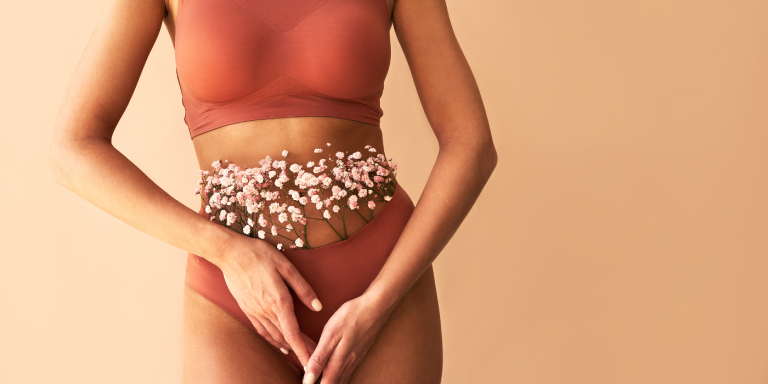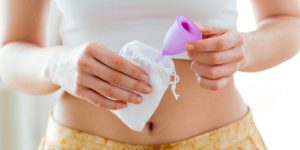
The complete guide to a healthy vagina

Most women are aware of how to care for their vaginas, but still, many aren’t! In this article, we’ll tell you everything you want to know about intimate care. From hygiene to hair removal and the right underwear. Read on and make your yoni happy!
Also read: Vaginal dryness? The best tips for a dry vagina
🌷Intimate care
Lesson #1: Don’t wash your vagina with soap. This has everything to do with the natural acidity of your vagina. Soap and shower gel disrupt this natural acidity. Yes, even the dedicated “intimate care products” for your vagina.
Lactic acid is produced in the vagina, which causes the skin near the vulva to be more acidic than in other parts of the body. This acidity protects against all kinds of external influences, but unfortunately this balance can also be disturbed, which in turn can lead to infections. If you wash your vagina with soap, you’re at a high risk of developing a nasty fungal infection.
A quick chemistry lesson: to measure acidity, we talk about a pH value. Around the vagina, this value is around 5.2 and on the rest of your body, it’s around 7. Ordinary soap therefore has a pH value of 7. As a result, if you wash your vagina with this, you’ll disturb this acidity.
“Washing with soap often leads to a nasty fungal infection.”
Washing with a vaginal wash?
It’s best to avoid washing with a special soap for down under. This is because the vagina is self-cleaning and thus really needs only lukewarm water. Now, there are several intimate cleansers on the market such as Lactacyd or Chilly that offer soap that does maintain the right pH value of your vulva and vagina. Still, there is a risk of washing too much and washing away the good bacteria. In this case, you’re still at risk of infections.
Do you feel like your vagina still smells really strong after washing with water? Chances are you might have an infection or some form of bacteria. If so, definitely don’t wash your intimate parts with soap! Instead, it’s best to schedule a visit with your doctor.
“Washing with a vaginal soap can cause you to wash too thoroughly and thereby wash away the good bacteria.”
🩲 Clean, cotton underwear
Putting on clean underwear every day is something we all learn to do as children. Still, we’d like to emphasise here: clean underwear is incredibly important for a healthy intimate area. It’s best to wear cotton underwear. Synthetic briefs make this area extra warm and vulnerable to bacteria. The vagina is already moist by nature, so make sure the material of your underwear is light and airy. After all, fungi love a warm, moist environment.
Also read: The effect of your menstrual cycle on your body and behaviour
🍎 You are what you eat
The right nutrition is important for a healthy body, including your private parts. If you suffer from vaginal complaints, it’s best to avoid coffee and alcohol as much as possible. This is because they cause a negative moisture balance and can mess up the protection of the vaginal flora. If you drink a lot of coffee or alcohol, it’s important to hydrate your body more. Water and herbal teas are great!
In addition, alcohol and soft drinks contain a lot of sugar. Sugar causes inflammation and lowers the resistance of mucous membranes. Starchy products such as bread, pasta, and biscuits can also weaken your mucous membranes.
It’s best to eat as many vegetables, fruits, and proteins as possible. Vegetables in particular contain a lot of prebiotic substances; fibre that feeds the good gut bacteria. The intestinal mucosa and vaginal mucosa ‘communicate’ a lot with each other through these bacteria, which is how you can positively influence your vaginal flora.

🩸Avoid using panty liners
Some ladies always use panty liners for vaginal discharge. However, it’s best to only use panty liners occasionally, as daily use increases the chances of irritation and infections. Change your tampon, pads, or panty liners often enough during your period to keep things as clean as possible.
A menstrual cup or menstrual underwear are also good alternatives. A menstrual cup also absorbs only menstrual blood and not the beneficial fluids from the vagina. In addition, menstrual underwear is made of cotton and supports your moisture balance.
Also read: How to use a menstrual cup
💦 Peeing after sex
Besides the fact that bladder infections are more common in women than in men, the risk of developing one also increases when you’re sexually active. This is because you contract the infection when bacteria move upwards into the urethra, invading the bladder, so to speak. The chances of getting a bladder infection after sex are higher, as a fair number of bacteria can reach the bladder during sexual intercourse. By peeing after sex, you can simply flush out these bacteria.
Good to know: you don’t have to rush to the toilet immediately after climaxing. Feel free to take some time to cuddle after. J Just make sure you don’t wait another 2 hours before going to the toilet, because there’s a bigger chance you’ll develop an infection.
“You don’t have to rush to the toilet immediately after climaxing. Feel free to take some time to cuddle after.”
🪒 Hair removal
Shaving the intimate area can be quite a hassle. Razor burn, ingrown hair, irritated skin, itching… Need help? Here are a few tips:
- Shave hair when it’s soft, i.e. when you’re in the shower or bath.
- Use a sharp and clean (!) razor blade.
- Scrub with a scrub especially made for your intimate area. Do this before shaving, or a few days after. Make sure you use the scrub only on your pubic mound and groin area and not on your labia. Scrubbing reduces the risk of ingrown hair.
- High pain threshold and ready for a more lasting solution? Try laser hair removal! This targets the hair follicles, first making your hair thinner and eventually preventing it from growing back. No hair means no ingrown hair, no bumps, no itching!
What’s your ritual for a healthy vagina?










Respond or ask a question
0 comments